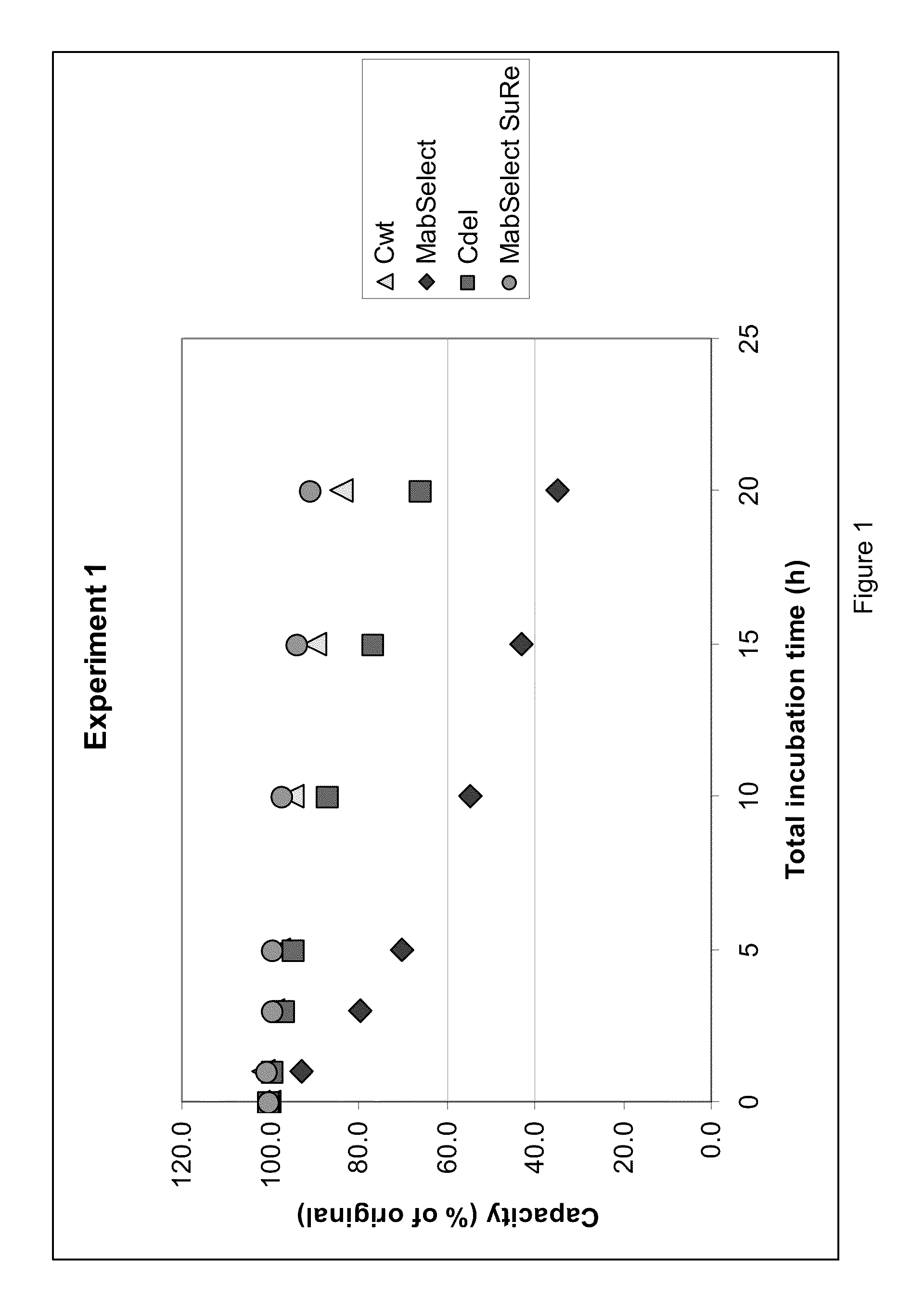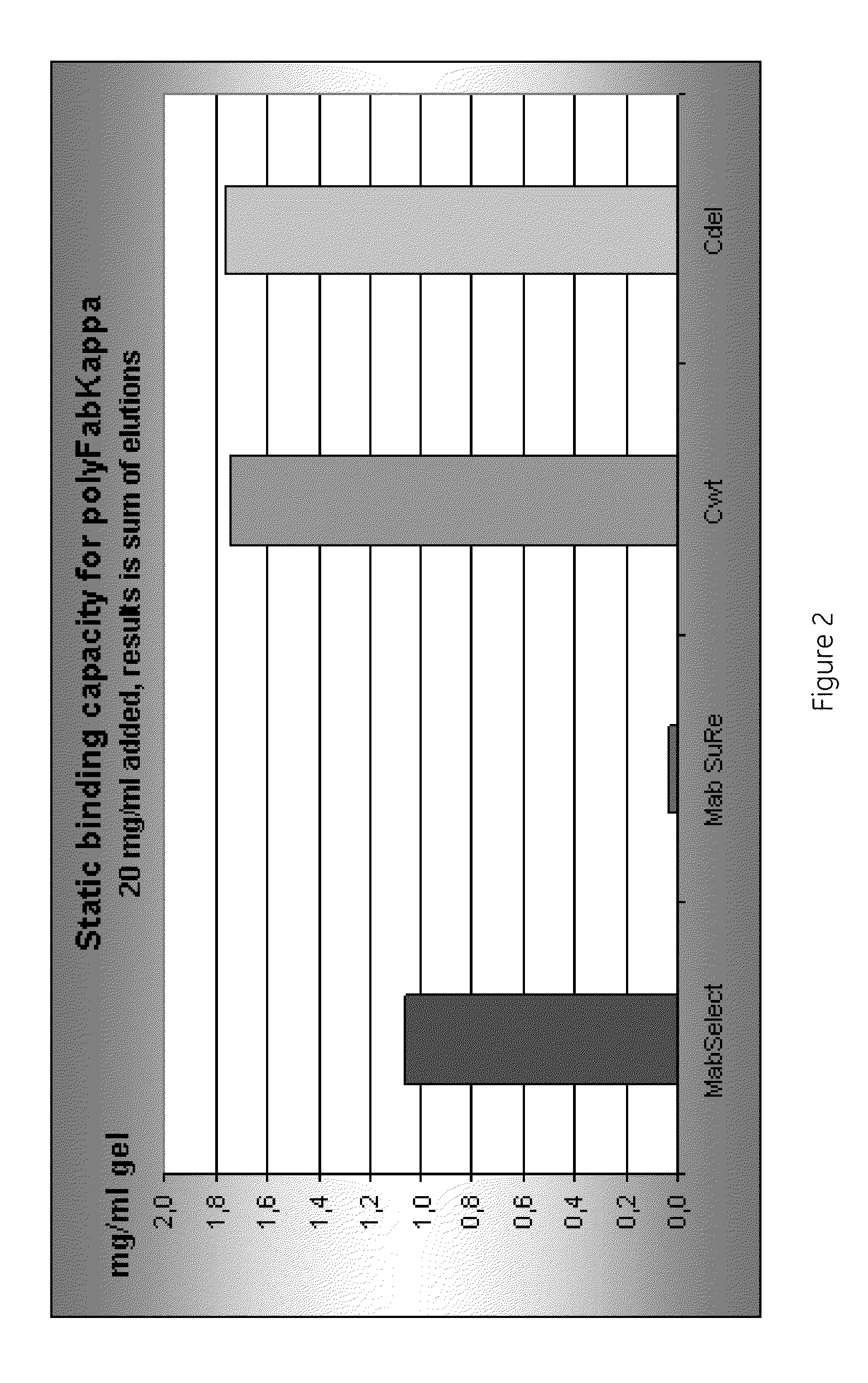Chromatography ligand comprising domain C from Staphylococcus aureus protein A for antibody isolation
a staphylococcus aureus and chromatography ligand technology, applied in the field of chromatography, can solve the problems of many affinity matrices, many ligands that are proteins, and pose a formidable challeng
- Summary
- Abstract
- Description
- Claims
- Application Information
AI Technical Summary
Benefits of technology
Problems solved by technology
Method used
Image
Examples
example 1
Column Study of the Alkaline Stability of Four Protein A-Derived Ligands
[0055]In this example, the alkaline stability of four chromatography matrices, two of which were comparative and two of which were according to the invention, were tested through a series of chromatographic runs:[0056]MABSELECT™ and MABSELECT SURE™ (both comparative products comprising protein-based ligands, GE Healthcare Bio-Sciences, Uppsala, Sweden), and[0057]Cwt (wild type Domain C from SpA, as defined in SEQ ID NO. 1), and Cdel (deleted wild type Domain C from SpA, as defined in SEQ ID NO. 2).
[0058]The IgG-binding capacity was measured initially and after incubation steps in 0.5 M NaOH. The incubation times varied from one to five hours, with an accumulated incubation time of 20 hours.
[0059]The ligands according to the invention were immobilized on agarose particles according to standard procedure and packed in columns (GE Healthcare). Two of the matrices, MABSELECT™ and MABSELECT SURE™, are commercial prod...
experiment 1
[0068]30 ml Gammanorm (165 mg / ml) was diluted to 1 mg / ml with 4950 ml Buffer A. The sample was filtered through 0.2 μm into a sterile 5 liter bottle.
[0069]Three 280 nm absorbance measurements were performed on the sample using NANODROP™ spectrophotometer: 1.2573 AU, 1.2432 AU and 1.2101 AU. Mean absorbance: 1.2369 AU.
[0070]The absorbance at 280 nm was also measured on ÄKTA EXPLORER™ 10. The sample was pumped with the system pump through the system in bypass mode. A 10 mm UV cell was used and the flow rate was 0.83 ml / min. The absorbance at 280 nm was 1510 mAU. This value was used as a reference when making capacity calculations.
Method Description
[0071]Normally, a CIP cycle for MABSELECT SURE™ involves 10-15 minutes contact time of the CIP solution (usually 0.1-0.5 M NaOH). To reduce the amount of CIP cycles in this study, longer contact times were used. The columns were incubated for 1, 2 and 5 hour intervals, with a total contact time of 20 hours. This corresponds to 80 to 120 cycl...
experiment 2
Binding
[0104]The Fab-binding ability of the different chromatography media was evaluated in a 96-well filter plate assay. Liquids and chromatography media were mixed on a plate vortex instrument for 1 minute. The bottom of the wells consisted of a filter which retained liquids and the particles of the chromatography media. When subjected to centrifugation, the liquids passed through the filter and were collected in a separate 96-well collection UV-plate attached to the bottom of the filter plate. The absorbance at 280 nm of the collected liquid was measured in a plate reader and used for detection and estimation of Fab. The liquids from different steps, e g washing, elution, were collected in different plates and measured separately, to be able to measure the amount of Fab in individual fractions.
10% slurry was prepared of each chromatography medium.
The filter plates were loaded with 200 μl slurry / well, i.e. 20 μl medium / well.
Equilibration—5×200 μl wash in PBS
Sample incubation—100 μ...
PUM
 Login to View More
Login to View More Abstract
Description
Claims
Application Information
 Login to View More
Login to View More - R&D
- Intellectual Property
- Life Sciences
- Materials
- Tech Scout
- Unparalleled Data Quality
- Higher Quality Content
- 60% Fewer Hallucinations
Browse by: Latest US Patents, China's latest patents, Technical Efficacy Thesaurus, Application Domain, Technology Topic, Popular Technical Reports.
© 2025 PatSnap. All rights reserved.Legal|Privacy policy|Modern Slavery Act Transparency Statement|Sitemap|About US| Contact US: help@patsnap.com


